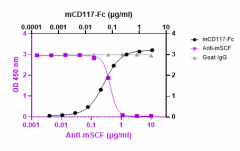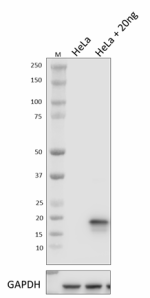- Clone
- Poly5417 (See other available formats)
- Regulatory Status
- RUO
- Other Names
- Kit Ligand, KITLG, Mast cell growth factor, MGF, Steel factor, SLF, Stem Cell Factor
- Isotype
- Goat Polyclonal IgG
- Ave. Rating
- Submit a Review
- Product Citations
- publications

-

Recombinant Mouse CD117-Fc chimera (Cat. No. 790802) (black circles) binds to immobilized Recombinant Mouse SCF (Cat. No. 579702). LEAF™ purified anti-mouse SCF (clone Poly5417) (purple squares) inhibits the binding in a dose-dependent manner, whereas LEAF™ purified goat IgG isotype control (gray triangles) does not have an effect. This antibody blocks the binding of 0.3 µg/mL Recombinant Mouse CD117-Fc chimera to 3 µg/mL immobilized Recombinant Mouse SCF. ND50 range: 0.07 - 0.6 µg/mL. -

Whole cell extracts (15 µg total protein) from HeLa cells were spiked with or without the indicated amount of Recombinant Mouse SCF protein (Cat. No. 579702) and were resolved by 4-12% Bis-Tris gel electrophoresis, followed by being transferred to a PVDF membrane and probed with 0.5 µg/mL LEAF™ purified anti-mouse SCF (clone Poly5417) for 2 hours at room temperature. Proteins were visualized by chemiluminescence detection using HRP donkey anti-goat. Direct-Blot™ HRP anti-GAPDH (Cat. No. 607904) was used as a loading control at a 1:50000 dilution. Lane M: Molecular weight marker
| Cat # | Size | Price | Quantity Check Availability | Save | ||
|---|---|---|---|---|---|---|
| 541703 | 100 µg | 288€ | ||||
SCF (KITL) is a hematopoietic growth factor, and it can synergize with a number of other cytokines to stimulate growth of hematopoietic progenitors in vitro and stimulates blood cell production in vivo. SCF is encoded by Sl ('steel'), a gene critical to the development of several distinct cell lineages during embryonic life. Even though KITL was identified as a soluble protein, the predicted amino acid sequence indicates that it is an integral transmembrane protein. KITL is generated by proteolytic cleavage from a transmembrane precursor. Two splice variants have been described for KITL, and proteolytic processing of both transmembrane protein products occurs on the cell surface. The binding of KITL induces the dimerization of the KIT molecule, followed by a change in the configuration of the intracellular domain and the autophosphorylation of the receptor, opening several docking sites for signal transduction molecules. Dysregulation of SCF–KI signaling and gain-of-function KIT mutations contribute to the genesis of many cancers, like acute myeloid leukemia and gastrointestinal stromal tumors.
Product DetailsProduct Details
- Verified Reactivity
- Mouse
- Antibody Type
- Polyclonal
- Host Species
- Goat
- Immunogen
- Recombinant mouse SCF
- Formulation
- 0.2 µm filtered in phosphate-buffered solution, pH 7.2, containing no preservative.
- Endotoxin Level
- Less than 0.1 EU/µg of the protein (< 0.01 ng/µg of the protein) as determined by the LAL test.
- Preparation
- The LEAF™ (Low Endotoxin, Azide-Free) antibody was purified by affinity chromatography.
- Concentration
- Lot-specific (to obtain lot-specific concentration and expiration, please enter the lot number in our Certificate of Analysis online tool.)
- Storage & Handling
- Upon receipt, store frozen at -20°C. Make small volume aliquots if needed and avoid repeated freeze-thaw cycles to prevent denaturing the antibody.
- Application
-
Block - Quality tested
WB - Verified - Recommended Usage
-
Each lot of this antibody is quality control tested by blocking the binding of 0.3 µg/mL recombinant mouse CD117-Fc chimera (Cat. No. 790802) to 3 µg/mL immobilized recombinant mouse SCF (Cat. No. 579702). ND50 range: 0.07 - 0.6 µg/mL. For western blotting, the suggested use of this reagent is 0.25 - 1.0 µg/mL. It is recommended that the reagent be titrated for optimal performance for each application.
- Application Notes
-
This antibody has not been tested for ICC.
- RRID
-
AB_2936595 (BioLegend Cat. No. 541703)
Antigen Details
- Structure
- Cytokine
- Distribution
-
SCF is widely expressed
- Function
- SCF has pleiotropic functions. It is involved in melanogenesis, gametogenesis, hematopoiesis, and brain angiogenesis.
- Interaction
- The KIT receptor tyrosine kinase (RTK) is expressed in hematopoietic stem cells (multipotent hematopoietic stem cells, progenitors committed to myeloid and/or erythroid lineages, and T and B cell precursors), mast cells, and acute myeloid leukemia cells.
- Ligand/Receptor
- SCF binds to the extracellular domains of the KIT receptor tyrosine kinase.
- Cell Type
- Embryonic Stem Cells, Hematopoietic stem and progenitors
- Biology Area
- Angiogenesis, Cell Biology, Immunology, Signal Transduction, Stem Cells
- Molecular Family
- Cytokines/Chemokines
- Antigen References
-
- Sun L, et al. 2006. Cancer Cell. 9:287-300.
- Magnol L, et al. 2007. BMC Dev Biol. 7:81.
- Liu H, et al. 2007. EMBO J. 26:891-901.
- Agosti V, et al. 2004. J Exp Med. 199:867-78.
- Huang E, el al. 1992. Mol Biol Cell. 3:349-62.
- Kitamura T, et al. 1989. J Cell Physiol. 140:323-34.
- Gene ID
- 17311 View all products for this Gene ID
- UniProt
- View information about SCF on UniProt.org
Related FAQs
- Do you guarantee that your antibodies are totally pathogen free?
-
BioLegend does not test for pathogens in-house aside from the GoInVivo™ product line. However, upon request, this can be tested on a custom basis with an outside, independent laboratory.
- Does BioLegend test each Ultra-LEAF™ antibody by functional assay?
-
No, BioLegend does not test Ultra-LEAF™ antibodies by functional assays unless otherwise indicated. Due to the possible complexities and variations of uses of biofunctional antibodies in different assays and because of the large product portfolio, BioLegend does not currently perform functional assays as a routine QC for the antibodies. However, we do provide references in which the antibodies were used for functional assays and we do perform QC to verify the specificity and quality of the antibody based on our strict specification criteria.
- Does BioLegend test each Ultra-LEAF™ antibody for potential pathogens?
-
No, BioLegend does not test for pathogens in-house unless otherwise indicated. However, we can recommend an outside vendor to perform this testing as needed.
- Have you tested this Ultra-LEAF™ antibody for in vivo or in vitro applications?
-
We don't test our antibodies for in vivo or in vitro applications unless otherwise indicated. Depending on the product, the TDS may describe literature supporting usage of a particular product for bioassay. It may be best to further consult the literature to find clone specific information.
Other Formats
View All SCF Reagents Request Custom Conjugation| Description | Clone | Applications |
|---|---|---|
| LEAF™ Purified anti-mouse SCF | Poly5417 | Block,WB |
Compare Data Across All Formats
This data display is provided for general comparisons between formats.
Your actual data may vary due to variations in samples, target cells, instruments and their settings, staining conditions, and other factors.
If you need assistance with selecting the best format contact our expert technical support team.
 Login / Register
Login / Register 












Follow Us